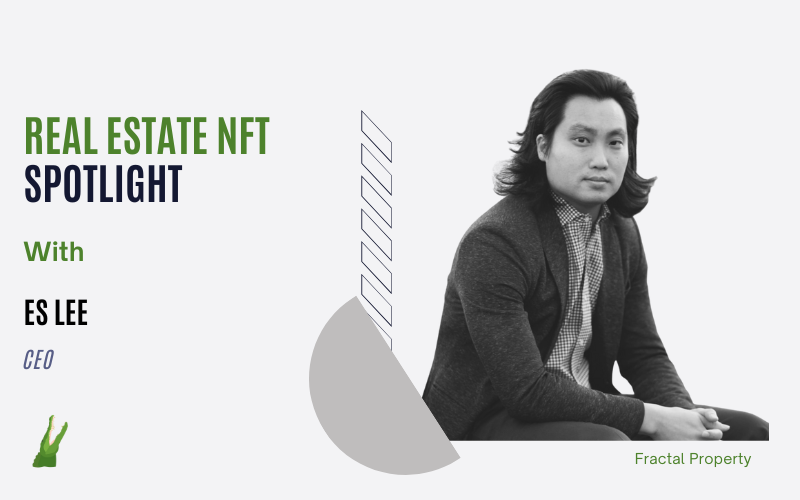Real estate NFT (not to be confused with NFT real estate) is slowly becoming a use case for non-fungible tokens. In January, venture capitalist, Bill Tai, said it was only a matter of time before stocks and real estate were sold as NFT. A month later, proptech firm, Propy, auctioned off a four-bedroom house in Gulfport, Florida as NFT that netted 210 ETH, with more listings in the pipeline.
Recently, the U.S. Treasury Department published a report mentioning that future applications of NFTs include enabling the recording and verification of transfers of real estate ownership.
Fractal Property, another player in the real estate NFT market, is offering NFTs backed by real estate. The platform was founded by CEO Es Lee, who co-founded Real Nifty, an NFT platform for real assets across different sectors like music, art, collectibles and real estate. During his time at Real Nifty, Lee saw the most demand for NFTs in real estate, which spurred him to create Fractal Property. The platform serves as a marketplace where sellers can create a property listing (a.k.a. mint an NFT), so property seekers can find it.
Lee describes the platform as being analogous to Craigslist, except that each listing is an NFT. For transactions on Fractal Property, the real estate contract is digital and payments are made in crypto. In this interview, he shares his insights on how NFTs can make property investing more accessible.
Please tell us about yourself and the story behind Fractal Property.
I have a background in tech and spent a good part of my career in finance but it’s always boggled my mind how difficult it is to transact and invest in real estate.
Fractal is a marketplace platform dedicated to the intersection of NFTs and physical real estate. Our marketplace will offer a number of NFTs backed by real estate, though our moonshot goal is that one day our platform could help consolidate properties on all the most common real estate property listing sites. We get inspiration from Multiple Listing Service (MLS), but we want to be kept on blockchain open to the public globally. Call Fractal the start of Universal Listing Service (ULS).
We’re still in the very early days of our startup, our current focuses are to educate and incubate ideas on initial use cases. We help people who want to create NFTs for their properties and offer consulting and tech development services. Often partnering with real estate companies and professionals to aid someone’s real estate NFT process.
What piqued your interest in the NFT space and where did you first hear about it?
I got into crypto through my last tech startup in messaging and AI where we wanted to give users ownership over their data. When I learned about NFTs last year, I found myself researching Cryptokitties and Cryptopunks into 2am one night. Coming from an investment background, I was amazed by the amount of market and technical analysis that was possible on a Cryptokitty- that amount wasn’t even possible for a stock, and all because all the data was publicly available on a blockchain.
I saw the potential for NFTs to catapult markets for all kinds of physical assets, not just digital ones. So I co-founded a company to build the initial tech/products and see where the market demand was. We got the most inbound interest for real estate, so I splintered off to focus on that through Fractal Property.
Where and when did you see demand for NFTs in physical real estate and why is there such a demand?
I think the problem with real estate is that even though it’s the largest asset class in the world and it’s a universal market – meaning every person pays for housing – transactions are inefficient and the tools and processes are archaic. Aside from online property listings, it’s like the real estate market completely missed the last century of technology.
Thanks to blockchain and NFT tech that’s already built, it’s possible for regular people to create all kinds of products around real estate akin to how stocks opened up ways to buy and invest in companies. An efficient stock market can create wealth for so many people. For example, any property can be fractionalized or split into components where buyers of the NFTs get appreciation rights (like stocks), income (like a dividend on the stock), or usage (like rent or timeshares). These rights can then be resold in the secondary market just like how people trade stocks.
How is Fractal meeting this demand especially when well-established U.S. laws and county land record offices do not recognize transfers of ownership with NFTs?
NFTs offer the added ability to pay for/book that listing directly and the contract is just in digital form and payment is done with cryptocurrency.
With sales, there are just more regulatory considerations, but the technology and usage can co-exist with all legal and regulatory frameworks because they can occupy different layers of the whole process at first. Think of NFTs not as a replacement for how things are currently done, but initially as an added layer, for marketing/discovery and for payments.
I get a lot of questions about regulatory hurdles, but it’s a high-class problem. If you become successful and big enough to regulate, you’ve made it. Uber and Airbnb are case studies. But with NFTs, the regulators and authorities can be automatically paid on every transaction for the value they bring. That’s something missing from other two-sided online marketplaces. In the future, if county land record offices or any other authority chooses, they can recognize transfers of ownership with NFTs. It could actually help them modernize their existing system and expand their services.
What are some of the technical and legal constraints when it comes to selling physical homes authenticated by NFTs?
I’m actually in the process of selling an investment property where I’m going through the conventional way of selling the property but complemented with an NFT. You can get more details here. The NFT is simply a bonus. If the buyer wants to pay me via crypto, they can do it via the NFT. This way I, as the seller, expanded my market to not just buyers on traditional listing sites like MLS or Zillow or RedFin, but to users of every NFT marketplace.
If the sale is done entirely the conventional way, I can send the NFT to the buyer’s wallet address if they have one. Then they’d be able to relist the property immediately through the NFT. This is the lowest lift example of using NFTs, to show how the old and future ways can work together.
There aren’t too many technical constraints stopping people from doing what they want to do. The tech, while still iterating, is far ahead of most use cases for now. The challenge is building the layers in the middle that simplify the process for the average person.
The legal considerations are none because they operate outside the scope of anything I’m doing with the NFT. I’ll still pay taxes on the sale and change the crypto to fiat, go through all the required forms/disclosures and pay my broker. If my broker’s firm accepted crypto, I could have just set their commission as a royalty on the NFT sale.
Could you tell us more about how NFTs can benefit the real estate market?
If every home had an NFT attached to it and MLS operated like the stock market, the real estate market would increase at least 20x to 100% because the home can always be “on the market”. Anyone who makes fees on real estate transactions can 20x their current earnings.
As soon as the home was purchased, the buyer gets the NFT and can set the asking price to whatever they want, effectively relisting property using the same NFT. Most people buy homes to live in, but everyone has a price they’d sell. If someone offered me twice the price I just paid for my home, I’d be looking for another one tomorrow. If someone offered me twice the market price to rent my apartment for the weekend, I’d go find a hotel room and pocket the difference.
I think every other aspect of real estate can ultimately be made more efficient with this tech.
If NFTs can’t replace existing real estate processes, what other utility do they have?
They can replace existing processes but it requires the owner of the current process to choose to learn about the tech, explore the value and find people to implement proofs of concept. That takes time. When e-commerce first started, it was touted as replacing brick-and-mortar stores but it took decades to grow and to this day there are some retailers who have no online presence. I’m optimistic NFTs will work faster than that.
It’s partially why we focused on real estate. Real estate is perfect for NFTs because transactions are only exchanges of rights and changes in records, unlike transacting say a car, where there’s physical delivery.
What are the most challenging aspects of your role at Fractal and how do you overcome these challenges?
Education. Most people’s eyes roll back as soon as you mention crypto or NFTs because they think it’s too complicated or a scam. To be honest, I don’t blame them. Unfortunately, hype and fraud make better headlines and it fuels our natural tendency to be suspicious of new technologies.
It’s somewhat unfortunate that NFTs found their early usages in digital assets where authenticity and scarcity were touted as their inherent value. For assets with inherent value like real estate, this proposition is entirely different. NFTs are valuable in their utility as a public listing, a contract or receipt, an efficient payment and record-keeping method, and most importantly, a secondary market, all rolled into one. My biggest challenge is getting people to see this value, so the way we overcome them is to show them use cases.
What can the real estate market expect from the NFT space and vice versa in the coming years?
We recently connected with real estate brokers who see NFT as a tool to broaden their services and are working with them to turn any property listing into an NFT. The advantage with the NFT is you create the listing once and it shows up on OpenSea, Rarible, and NFT marketplaces around the world. Also instead of sitting on one proprietary database, it sits on a public database, a.ka. blockchain.
I suspect NFT marketplaces like OpenSea will branch into real estate as direct competition to current listing services. We’ve already seen property listings as Google ads for OpenSea. Elsewhere, there will be startup services to manage the bidding/auction process using NFTs as tech.
On the flip side, the NFT world will look to recruit real estate talent with books of business, guidance for navigating local markets, and creating real estate-specific products, protocols and tech infrastructure. Proptech companies, innovation teams of service providers and even municipalities look to NFT/crypto tech experts to modernize their payment (e.g. taxes) tech with blockchain-powered tech.
What do you think about the current state of the NFT space? What kind of role is Fractal playing in it?
I think we’re in the early stages of NFTs and web3. We had to go through an initial period of hype and froth that washed out a bunch of people who were into NFTs for the wrong reasons. I’m optimistic there will be innovators out there who see this tech not as a money grab but as a way to build sustainable tech and models that benefit the average person over time.
The mistakes we see with others in bridging physical real estate with NFT are trying to replace a process too quickly, or using the tech to solve a non-existent problem, or giving up after the first attempt. The first proof of concept won’t be a raging success, but it’s a foundation to iterate on and inspire ideas.
Where do you think we could see real estate NFTs in the near future?
I have a vision that one day, you could type in “room” or “bed” into Google maps and have thousands of nearby pins show up with a listing of an affordable place you can spend the night and a button to book and pay for it. It’ll be like Uber but for homes, but with the efficiency and liquidity of stocks, lower fees, and be powered by NFT tech.
The lister will get 95%+ of the payment and the taxes and fees are automatically paid to the proper authorities as royalties on the NFT, commensurate with the value they provide. If you decide on another place, you can resell your night right away. If you like the place you stay at, you could end up never leaving because you bought the ownership NFT.
The tech for all this has already been invented, it’s just a matter of people putting together the pieces and the market to follow.
Stay up to date:





